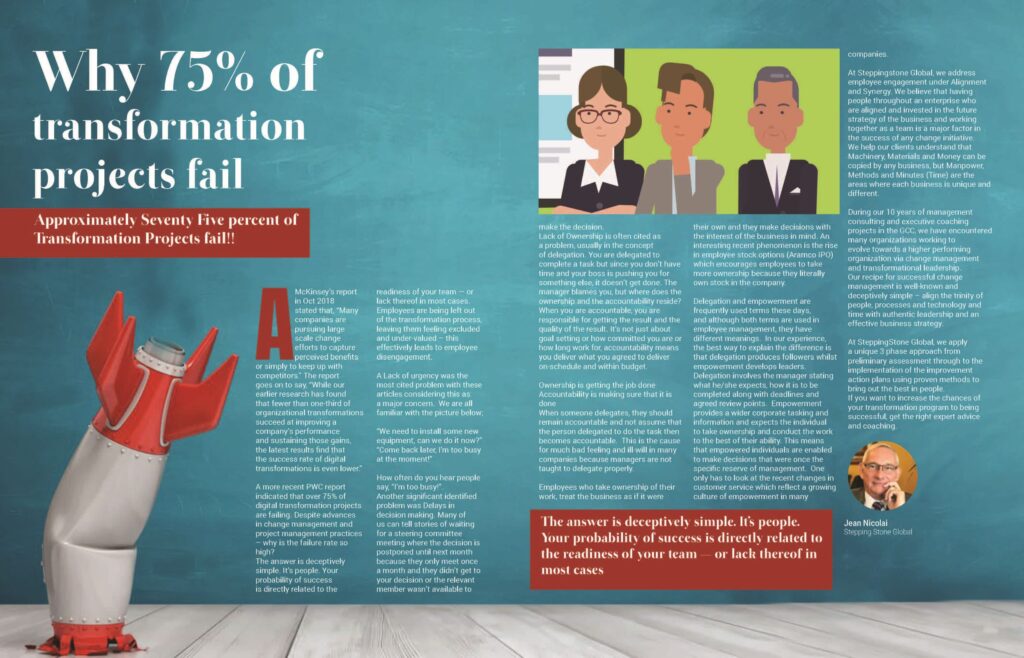A McKinsey’s report in Oct 2018 stated that, “Many companies are
pursuing large scale change efforts to capture
or simply to keep up with competitors.” The report goes on to say, “While our earlier research has found that fewer than one-third of organizational transformations succeed at improving a company’s performance
and sustaining those gains, the success rate of digital transformations is even lower.” A more recent PWC report indicated that over 75% of
digital transformation projects are failing. Despite advances in change management and project management practices – why is the failure rate so
high? The answer is deceptively simple. It’s people. Your probability of success is directly related to the readiness of your team — or
lack thereof in most cases. Employees are being left out
of the transformation process, leaving them feeling excluded
and under-valued – this effectively leads to employee
disengagement. A Lack of urgency was the most cited problem with these
articles considering this as a major concern. We are all familiar with the picture below; “We need to install some new equipment, can we do it now?”
“Come back later, I’m too busy at the moment!” How often do you hear people say, “I’m too busy!”.
problem was Delays in decision making. Many of us can tell stories of waiting for a steering committee meeting where the decision is
postponed until next month because they only meet once a month and they didn’t get to your decision or the relevant member wasn’t available to
Why 75% of transformation projects fail Approximately Seventy Five percent of Transformation Projects fail!! make the decision. Lack of Ownership is often cited as a problem, usually in the concept
of delegation. You are delegated to complete a task but since you don’t have
time and your boss is pushing you for something else, it doesn’t get done. The manager blames you, but where does the ownership and the accountability reside? When you are accountable, you are responsible for getting the result and the quality of the result. It’s not just about goal setting or how committed you are or how long work for, accountability means
you deliver what you agreed to deliver on-schedule and within budget.
Ownership is getting the job done Accountability is making sure that it is
done When someone delegates, they should remain accountable and not assume that the person delegated to do the task then becomes accountable. This is the cause for much bad feeling and ill-will in many
companies because managers are not taught to delegate properly.
Employees who take ownership of their work, treat the business as if it were their own and they make decisions with the interest of the business in mind. An interesting recent phenomenon is the rise in employee stock options (Aramco IPO) which encourages employees to take more ownership because they literally own stock in the company. Delegation and empowerment are frequently used terms these days, and although both terms are used in employee management, they have different meanings. In our experience, the best way to explain the difference is that delegation produces followers whilst empowerment develops leaders.
Delegation involves the manager stating what he/she expects, how it is to be
completed along with deadlines and agreed review points. Empowerment
provides a wider corporate tasking and information and expects the individual to take ownership and conduct the work to the best of their ability. This means that empowered individuals are enabled to make decisions that were once the only has to look at the recent changes in
culture of empowerment in many companies. At Steppingstone Global, we address employee engagement under Alignment and Synergy. We believe that having people throughout an enterprise who are aligned and invested in the future strategy of the business and working together as a team is a major factor in the success of any change initiative. We help our clients understand that Machinery, Materials and Money can be copied by any business, but Manpower, Methods and Minutes (Time) are the areas where each business is unique and different. During our 10 years of management
consulting and executive coaching projects in the GCC, we have encountered many organizations working to evolve towards a higher performing organization via change management and transformational leadership. Our recipe for successful change management is well-known and deceptively simple – align the trinity of people, processes and technology and time with authentic leadership and an
effective business strategy. At SteppingStone Global, we apply
a unique 3 phase approach from preliminary assessment through to the
implementation of the improvement action plans using proven methods to
bring out the best in people. If you want to increase the chances of
your transformation program to being successful, get the right expert advice and coaching. The answer is deceptively simple. It’s people. Your probability of success is directly related to the readiness of your team — or lack thereof in most cases- Jean Nicolai

